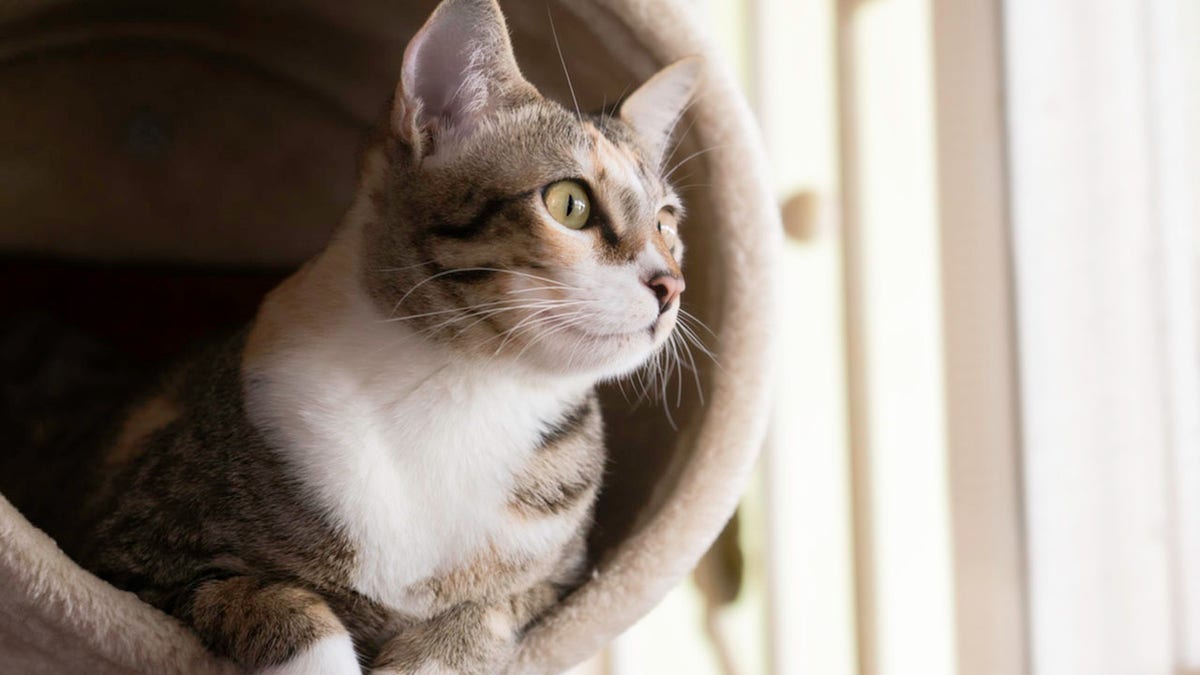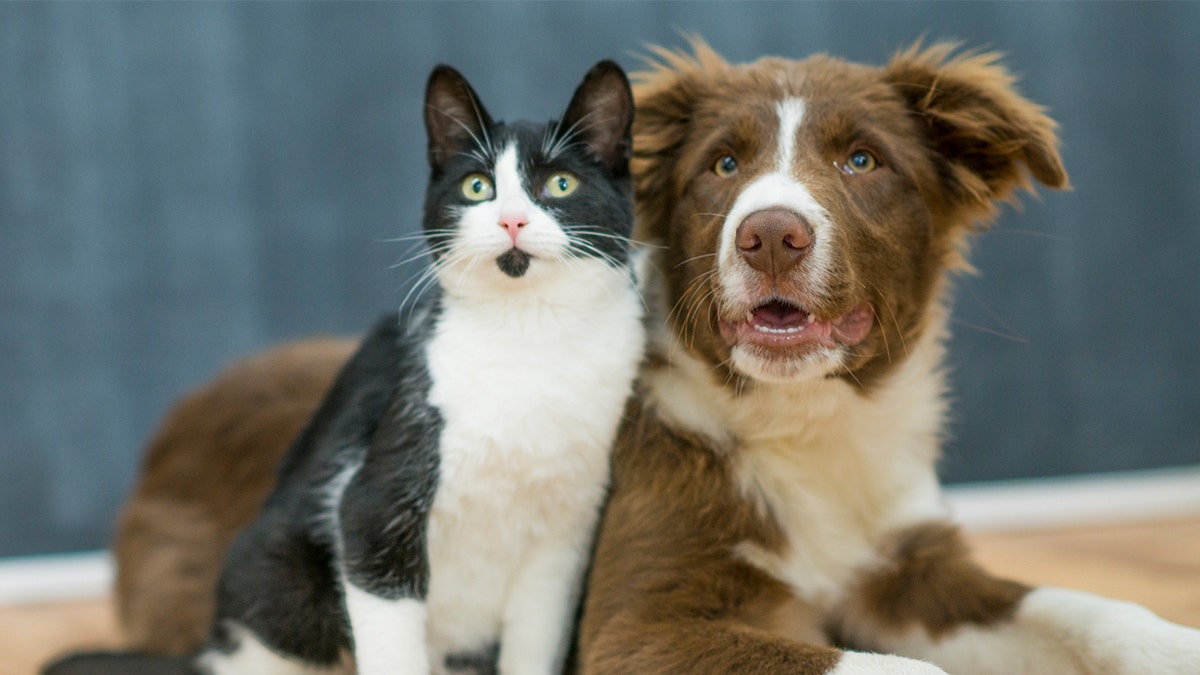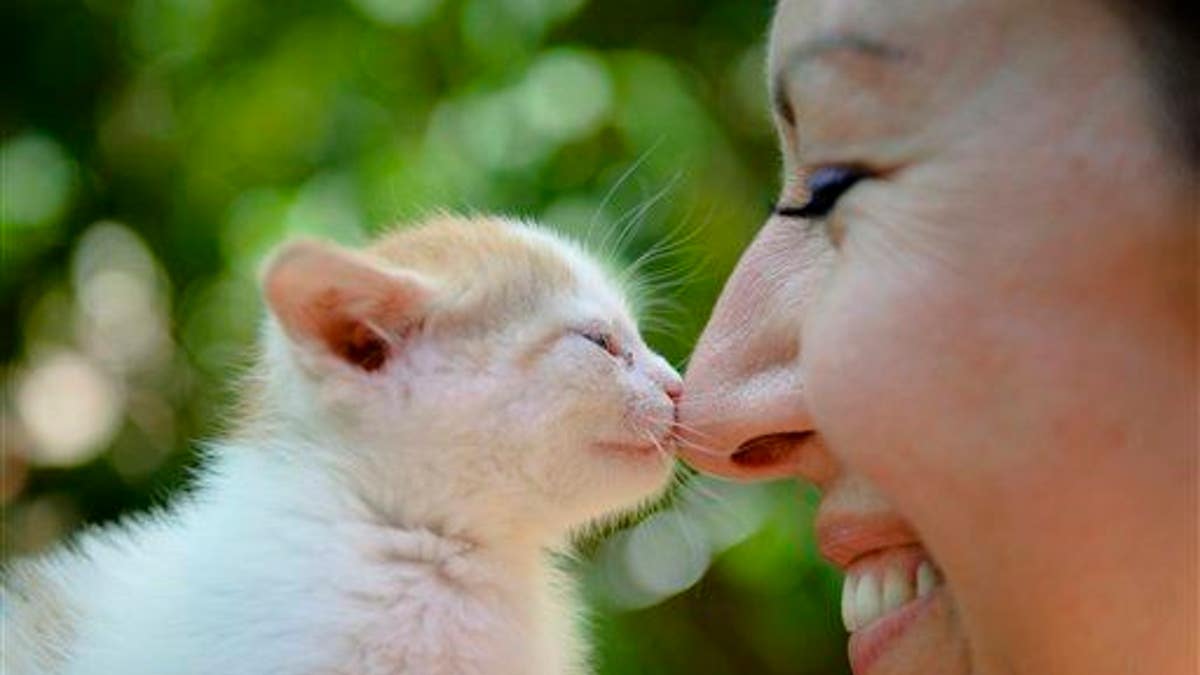'Fox & Friends Weekend' celebrates Pete Hegseth's birthday with kittens
'Fox & Friends Weekend' celebrates host Pete Hegseth's birthday by bringing kittens onto the set.
June is National Adopt a Cat Month (also known as Adopt a Shelter Cat Month). It’s a great time to learn cat-friendly ways of preparing your home for a new fur baby — as well as knowing which cat is best for you and how to best care for whatever new feline friend you might adopt.
Feline breeding season — kitten season — runs from spring to early fall, and many shelters experience the majority of their cat and kitten intake during this time of year.
That's according to the American Society for the Prevention of Cruelty to Animals (ASPCA), a nationwide nonprofit.
So if you're looking to adopt a cat or kitten, this could be a very good time to visit your local animal shelter.
As with any new pet adoption, there are important factors to consider before taking a cat into your home — such as the necessary time, commitment and money to take proper care of an animal.

Close-up of a short-haired cat perched on its indoor cat condo. Is your home ready for a new cat? Check out the expert tips shared here. (iStock)
Here is some key information to help you through the initial steps of finding the purrfect fur companion for you and yours.
Make sure everyone's on board
The first step when considering cat adoption is to make sure everyone in the household is prepared to welcome a new pet, including children and any other family members, according to Tina Reddington Fried, senior director of feline programs at the Los Angeles ASPCA.
Families with existing pets need to weigh carefully whether another animal can be accommodated comfortably or not.
"If there are children under 12 years old in the home, the child's parents should be ready and eager to assume care for the animal," she told Fox News Digital.
"Children who are above age 12 and entering middle-school years are generally becoming more responsible and can contribute to handling basic pet care tasks," she said.

If you've got a dog at home already, consider carefully whether your animal will be comfortable with a new cat coming into the house. (iStock)
Also, families with existing pets need to weigh carefully whether another animal can be accommodated comfortably into the home, depending on the pet and its age, personality and needs.
Choose the right cat
When it comes to choosing the right cat to adopt, prospective adopters should keep an open mind and heart, ask questions and rely on shelter staffs for guidance.
"Every animal — even within a specific breed or species — has an individual personality and disposition," advised Reddington Fried.

"Draw up a schedule" of the family members who will help "with the care of your new pet," advised Tina Reddington Fried of the ASPCA in Los Angeles. (iStock)
"When preparing to adopt, it is a good idea to draw up a schedule of who in the family will help with the care of your new pet," she said, "including playing, feeding, grooming — and changing the cat's litter."
Reddington Fried encourages adopters to keep an open mind when adopting. Why? Because people may "fall in love" with a pet they'd never before considered.
Consider more than one animal
If your family is open to adopting more than one pet, consider asking the staff at the shelter about taking home kittens from the same litter.
"Adopting kittens who already know each other will also be easier than introducing a new cat to the home later."
"Most kittens benefit from having a companion and can learn important skill sets from each other when adopted together," she said.
"Adopting kittens who already know each other will also be easier than introducing a new cat to the home later."

Make sure your home or apartment is fully cat-proofed before you welcome a new pet into your life — for the animal's health and safety.
Potential adopters should consider senior pets, as they're typically the last to be adopted — and "may even be more suitable to your lifestyle."
"From the onset," said Reddington Fried, "senior pets are already set in their ways with their own personalities — so, you can likely find a senior who has all the personality traits you're looking for in a new pet."
Find the right animal shelter or animal rescue
Natalie Buxton is director of marketing and communications for Operation Kindness, a nonprofit animal shelter in Carrollton, Texas, a suburb of Dallas.
She said owners sometimes find themselves needing to surrender cats and kittens for a variety of reason, such as allergies among family members or economic reasons.
"The pet that you adopt should be spayed or neutered."
"We do our best to help support them with resources, such as [giving them] free pet food and litter, to help keep cats in their homes," she told Fox News Digital.
Yet despite the best efforts, cats and kittens are often still surrendered — which is why private shelters, humane societies and rescue groups are good places to seek a new pet.

A woman touches noses with a kitten during an adoption event. Cats need more time than dogs to get acclimated to their new surroundings. (AP Photo/Andreea Alexandru, Mediafax)
"You can read reviews online to help you find a reputable organization," said Buxton.
"Nonprofit animal organizations will also be rated by Charity Navigator or Guidestar, so that can be helpful for finding a trustworthy organization," she said.
"The pet that you adopt should be spayed or neutered, and [those locations] are usually current on [the animals'] vaccinations," as well as on microchipping.
Prepare your home or apartment
When you decide to adopt a cat, your home or apartment needs to be safe for the animal. Objects such as poisonous plants, toxic foods like garlic and onions — plus household chemicals — should be completely out of reach.
"Be sure to install high-quality metal screens on all windows and provide a variety of scratching posts and perches for the cats to use," said Reddington Fried.

Before adopting a beautiful kitten such as this one, talk to a veterinarian so that you have the necessary information about the cat's nutritional needs. (iStock)
The ASPCA recommended talking to a veterinarian ahead of time about the correct food for a cat's nutritional needs, since those needs vary by age.
All indoor cats need a litter box, which should be placed in a quiet, accessible location.
NEW STUDY SHOWS THE EFFECT THAT OWNING A PET HAS ON OWNERS' BRAINS
In a multi-level home, said the ASPCA, there should be one litter box per floor. Avoid moving the litter box unless absolutely necessary — and keep it clean.
"Cats won't use a messy, smelly litter box, so scoop solid waste out of the box at least once a day," the organization advised.
Take it slowly with your new pet
The most important piece of advice is to take things slowly. Cats require more time than dogs to acclimate and get comfortable in a new home.
Allow your cat access to one room at a time (such as a guest bedroom, office or bathroom). Then, give your pet access to more space in the house slowly, as your new pet gets comfortable, Buxton explained.
"Take things slowly, speak softly to the cat and allow the cat to come to your child at its own pace."
"Having places for the cat to retreat, such as cat towers or cardboard boxes, will also give them some security in their new space," she said.
"With kids [in the house], take things slowly, speak softly to the cat and allow the cat to come to the child at its own pace," she also said.
"Don't force pets or pick up a cat that is not comfortable — or you risk getting scratched or bitten."
Know about vet costs
Cats should see the vet at least once a year for a check-up, say the experts.
TODAY'S VETERINARIAN SHORTAGE: HOW IT COULD AFFECT YOUR DOG OR CAT
Early preventative care should be part of the adoption fee, which typically ranges from $40 to $75, as Fox News Digital previously reported.
The ASPCA suggests $150 as an offering when adopting an animal "to help continue our lifesaving work and help even more animals in need."

A puppy and a cat are shown playing outdoors in a garden. Most veterinarians and animal experts advise keeping cats indoors.
Check online for resources on low-cost vaccine clinics such as PetVet, which offer veterinary care wellness centers and community clinics.
To optimize a new cat's health, Buxton said it's best to keep the animal indoors.
This "will likely reduce the potential for expensive vet bills. Outdoor cats are more prone to illness and injury. You can protect your cats by keeping them inside and allowing them outdoors [only] under supervision."
CLICK HERE TO SIGN UP FOR OUR LIFESTYLE NEWSLETTER
The ASPCA estimates there are 6.3 million companion animals who enter American animal shelters nationwide each year. Of those, approximately 3.2 million are cats.
By the way, if you find kittens outside this season, pause and assess the situation first before doing anything.
CLICK HERE TO GET THE FOX NEWS APP
Newborn kittens and very young kittens — among the most vulnerable animal populations — are often removed too soon from their original environments. Often, the mama cat may be nearby, advises the ASPCA.










































